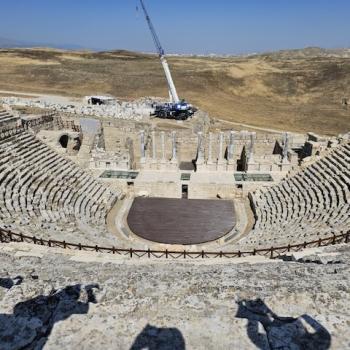(James Howell is the senior minister at my home church Myers Park UMC in Charlotte N.C. The following is taken from his summer series on Genesis).
———-
 In Genesis 17:2, God urges Abraham to “walk before me, and be perfect.” Much as we might dream of perfection before God, not many of us think we have the slightest chance to get anywhere near perfection – at anything, much less in the eyes of God.
In Genesis 17:2, God urges Abraham to “walk before me, and be perfect.” Much as we might dream of perfection before God, not many of us think we have the slightest chance to get anywhere near perfection – at anything, much less in the eyes of God.
But what is this perfection? and why does God ask such an obviously flawed person to be perfect? The contours of perfection might surprise us. Abraham, repeatedly, questions God – and questions are not contrary to faith, but are at the very heart of an open existence with the God who isn’t afraid of questions. Abraham, Jeremiah, Paul, and all great saints through history have questioned God; even Mary, when being told she would be the mother of God’s own son, asks “How shall this be?” (Luke 1:34). Faith seeks to understand, faith longs to know more, faith doesn’t settle for half-baked half-truths.
The ultimate question in the life of faith is “How long, O Lord?” (Psalm 13:1) – and who better to ask than Abraham? He was already 75 years old when God got started with him, but he had to wait decades for the fulfillment of God’s promise. We modern people aren’t very patient with promises, or good at making and fulfilling them. We want what we want now, we don’t wish to wait – but the Promiser says Wait, I will come, I will act, but part of the delight, the joyful discipline, is in the waiting, the delayed fulfillment.
Perfection isn’t being squeaky clean, morally speaking; perfection is about being willing to wait, to trust that God, in God’s good time, will deliver. After all, it is God, so it is all grace. Perfection is being forgiven; perfection is following Christ (Matthew 5:48).
Grace and love have a necessary corollary – which is a changed life. God makes outlandish promises to Abraham, but for Abraham to live into what God plans, for Abraham not to squander the gift, Abraham must change. “He must become a different kind of man, one fit not only to walk in the land, but also to walk before the Lord” (Russ Reno). In Abraham’s case, actual physical change, a bodily holiness is required – in the form of circumcision. Paul is at pains to insist you can follow Christ without being circumcised. But he is very clear that bodily holiness matters; if we do not consecrate what we do with our hands and feet, what we eat and drink, how we use our body, we fritter away the marvelous gift of grace and ruin what was God’s beautiful work – not only for us but also in us.
Christian theologians have always insisted on the dual importance of justification and sanctification: justification is what God has done for us, sanctification is what God does in us and with us. We would not even wish to receive from God without living for God, and doing so realistically, with all our might, our bodies, our minds and practical actions.
It seems that, for Genesis, this perfection required of us is a dedication of not just our souls but also our bodies to God; and as John Wesley thought about it, we are always “going on to perfection,” which doesn’t mean we are already perfect, but we are headed in the direction of perfection in our walk before God. Holiness, striving for bodily perfection, is what we do while we wait for the sure fulfillment of God’s sacred promise.
James












